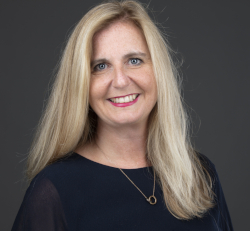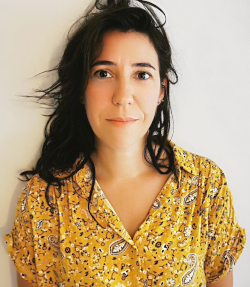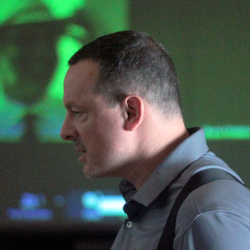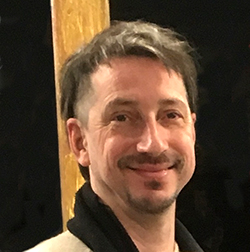
IMPEC 2024 Conference > Guest speakers
Nathalie LACELLE
Université du Québec à Montréal
Invited IMPEC speaker of July 3rd, 2024
[More information tba]
*****
Emilie VAYRE Université Lumière Lyon 2, France
Invited IMPEC speaker of July 4th, 2024
Emilie Vayre is Professor of Work and Organisational Psychology at the Université Lumière Lyon 2. Her research focuses on the psychosocial challenges of new ways of working (hybrid work, teleworking, flex-office work, coworking) and their effects on the relationship to work, management styles, work teams, professional relationships, gender equality, health and life balance. She is editor-in-chief of the journal 'Psychologie du Travail et des Organisations' (Elsevier publishing), and a member of the Boards of the Association Française de Psychologie du Travail (AFPTO) and of the Association Internationale de Psychologie du Travail de Langue Française (AIPLTF). She is also a member of the scientific committees responsible for preparing major national surveys carried out by DARES (CT- RPS, TraCov and TraCov 2 surveys) and a member of the scientific committee of the Telework Observatory.
From telework to hybrid work: some psychosocial issues As a result of the health and social situation, the Covid-19 crisis radically changed the way work is organised and marked a turning point in the use of teleworking. Post-pandemic, organisations, managers and workers have opted to make hybrid working a permanent feature. Identifying the levers on which to act and the risks to be prevented is therefore vital if we are to support the deployment of the ways of organising work 'of tomorrow', which are conducive to the quality of work and the well-being of workers. With this in mind, the conference proposes to address the following questions in order to initiate the debate: What impact does teleworking have on work, working conditions, the relationship with work and the organisation? What are the changes in managerial practices? What are the risks in terms of professional relationships, work collectives and social cohesion? What are the effects on physical and mental health, work-life balance and quality of life? What are the issues in terms of professional equality?
Chênevert, D., Giauque, D., Abord de Chatillon, E., Delobbe, N., & Vayre, É. (2023). From teleworking to hybridity: a new way of thinking about the management of our organisations?. Revue internationale de psychosociologie et de gestion des comportements organisationnels, XXIX, 5-22. Dolce, V., Vayre, É., Molino, M., & Ghislieri, C. (2020). Far Away, So Close? The Role of Destructive Leadership in the Job Demands–Resources and Recovery Model in Emergency Telework. Social Sciences, 9(11), 196. Gachet-Mauroz, T., Cros, F., Maillot, A-S., Delobbe, N., & Vayre, É. (2022). Incidences de la (ré)organisation du (télé)travail en temps de crise du point de vue de l’encadrement intermédiaire. Pratiques Psychologiques, 28(3), 157-175. Maillot, A-S., Meyer, T., Prunier-Poulmaire, S. & Vayre, É. (2022). A Qualitative and Longitudinal Study on the Impact of Telework in Times of COVID-19. Sustainability 14, 14: 8731. Ghislieri, C., Dolce, V., Sanseverino, D., Wodociag, S., Vonthron, A.-M., Vayre, É., Marianna, G., Molino, M. (2021). Might insecurity and use of ICT enhance internet addiction and exhaust people? A study in two European countries during emergency remote working. Computer in Human Behavior, 126:107010. Vayre, É. (2019). Les incidences du télétravail sur le travailleur dans les domaines professionnel, familial et social. Le travail humain, 1(82), 1-39. Vayre, É., Devif, J., Gachet-Mauroz, T., Morin Messabel, C. (2022). Telework: What is at Stake for Health, Quality of Life at Work and Management Methods? In É. Vayre (Ed.), Digitalization of Work. New Spaces and New Working Times (pp. 75-102). Wiley – ISTE. Vayre É., Morin-Messabel C, Cros F, Maillot A-S, Odin N. (2022). Benefits and Risks of Teleworking from Home: The Teleworkers’ Point of View. Information. 13(11):545.
*****
Nick MONTFORT
Massachusetts Institute of Technology & Center for Digital Narrative, University of Bergen
Photo credit: by sal nunkachov paperviewbooks.pt
Invited IMPEC speaker of July 4th, 2024
As a poet and artist, Nick Montfort uses computation as his medium. His computer-generated books range from #! to Golem. His digital projects include the collaborations The Deletionist and Sea and Spar Between. Montfort is a scholar, researcher, and educator. His MIT Press publications include The New Media Reader (which he co-edited) and Twisty Little Passages, The Future, and Exploratory Programming for the Arts and Humanities. He is professor of digital media at MIT and principal investigator in the Center for Digital Narrative at the University of Bergen. He directs a lab/studio, The Trope Tank, and lives in New York City.
Free (Libre) Software, Creative Computing, and Text Generation Those who know a little about free (libre) software will know that it runs much of our computing infrastructure: The Linux kernel, the Apache Web server, MySQL, almost all programming languages, and so on. It may be less obvious that free (libre) software is a social movement aimed at empowering people as they use computers. Also, free (libre) software is not just restricted to the command line and to these fundamental uses. It has also been important to creative computing, enabling new types of play, learning, and artistic development. I’ll briefly give examples of important free (libre) software developments throughout creative computing, including the interactive visual arts and programming in performance (live coding). In the last section, I’ll focus on the special case of creative text generation, one major topic of recent years. While “generative AI” is associated with proprietary corporate demos, there are free and open large language models and many other types of text generation systems, several of which are also free (libre) software. *****
Lilyana PETROVA & Sylvain REYNAL
ENSEA (École Nationale Supérieure de l’Électronique et de ses Applications), ETIS laboratory (UMR 8051 CNRS-ENSEA-CYU).
Invited IMPEC speakers of July 5th, 2024
Lilyana Petrova is a transdisciplinary artist-researcher and a tenured professor of Art/Science & Technology Studies at ENSEA. She is a member of the Design-STS Research Group at ETIS. Lilyana's work focuses on interdisciplinary approaches and interdisciplinarity as a field of research. She examines the ways in which different systems of knowledge production are articulated. In particular, she investigates disciplinary crispations when studying cross-disciplinary issues. Since 2022, she has been the Director of Studies for the Bachelor's programme in Information Technology and Society (Human-IT) at ENSEA, which is structured to strike a balance between learning in the engineering sciences (mathematics, physics and computer science) and in the humanities and social sciences (philosophy, art, anthropology and politics). She is committed to the introduction of sensitive, non-quantitative approaches in engineering teaching and research. Sylvain Reynal (Syd) is a transdisciplinary artist-researcher and a tenured professor of Science & Technology Studies at ENSEA. He is a member of the Design-STS Research Group at ETIS, and he has also been a long time lecturer at ENSAPC. He carries out a genuinely transdisciplinary artistic research that thrives on a sensitive conversation between art and autonomous machines. His work investigates the ambivalence of postmodern subjects in their relation to technology, showing how actes manqués underpin every act of resistance to a rational and optimized organization of the world. Traces, unspeakable legacies, and multiscale approaches thus form the core of his recent work, making use of various mediums, from interactive electronic & robotic installations to tailored-made sound devices to performing arts. The concept of digital gestures in particular, that is, gestures linked to digital craftsmanship (coding, PCB design, 3D CAD, ...) is central to his practice, with bugs and faults - both inextricably linked to digital technology - figuring an extra medium in itself. In this respect, his work is indirectly shaped by hacking and circuit bending subcultures, but also relates to the dialectic between intimacy and universality that is so deeply rooted in the concept of gesture.
T.V. Europe: for the introduction of ‘vagueness’ in space Terrain vague, terrain vogue, empty or vacant land... The French expression ‘Terrain Vague’ is fundamentally polysemous: ‘Terrain’ (field, soil, land, ethnographic fieldwork), and ‘Vague’ (vague, vacant, nebulous, spleen, but also wave or tide, when used as a noun). The expression evokes notions as diverse as interstice, gap, fissure, void, room, path, zone, area and crevice. Here, Terrain Vague is above all an approach that explores the notion of (research, experimental or screen) space in all of its semantic variations. Whether public, terrestrial, transcendental or intimate, space is an essential anchor of our human, social and physical being (referring here to the uncertainty principle of quantum mechanics). As Maurice Merleau-Ponty put it: "Our body is not in space, it is space itself". By combining practices from art, teaching, Science and Technology Studies and vague à l'âme, we propose to reinvest our relationship to the imprecision of space and its vagueness. |
| Online user: 2 | Privacy |

|




